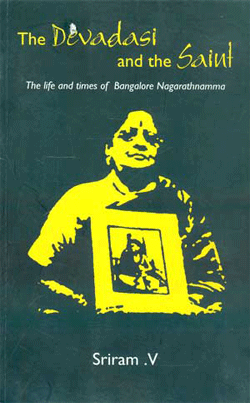Apr 19, 2024
Apr 19, 2024
 When one finished reading the book ‘The Devadasi and the Saint’ by Sriram V on the life and times of Bangalore Nagarathnamma he/she cannot feel but left with mixed feelings. It is from admiration to frustration. It is true that truth is many times stranger than fiction and Sriram has taken special pains to collect the life and times of a devadasi who took pride to call herself one till the end notwithstanding the social ostracization of that time on the community developed suddenly in the form of sudden social reorganization; thanks to Dr Muthulakshmi Reddy another Devadasi turned social reformer to initiate anti nautch move that wiped out the community as a blemish in the society.
When one finished reading the book ‘The Devadasi and the Saint’ by Sriram V on the life and times of Bangalore Nagarathnamma he/she cannot feel but left with mixed feelings. It is from admiration to frustration. It is true that truth is many times stranger than fiction and Sriram has taken special pains to collect the life and times of a devadasi who took pride to call herself one till the end notwithstanding the social ostracization of that time on the community developed suddenly in the form of sudden social reorganization; thanks to Dr Muthulakshmi Reddy another Devadasi turned social reformer to initiate anti nautch move that wiped out the community as a blemish in the society.
Sriram has painstakingly chronicled the various stages of Nagarathnamma’s life with meticulous reference materials to substantiate his statements which is laudable. Please don’t come to the conclusion since the title states ‘Saint’ the book is no biography but hagiography. The author presents the facts and happenings with great sense of impartiality.
A girl born in a devadasi family is an asset as she can be trained into a musician, danseuse and also can find affluent patrons to support them lavishly apart from the income they receive from the temples to which they are ordained. In a way it is a fact that devadasis though the ambassadors of fine arts and culture they also lead a life of promiscuity. Those periods it was not taken very seriously as they are considered to be the ‘handmaidens’ of God.
It is not that all those born in that community rose to the top and made it big as Bangalore Nagarathnamma. She too had her highs and lows but what one cannot but admire is her erudition, gumption and surprisingly the extraordinary devotion she developed for Tyagaraja, the saint composer of great merit.
Nagarathnamma actually had migrated from Mysore to the then Madras and ultimately the small town Tiruvayyaru in Tamil Nadu where Saint Tyagaraja lived and died. Nagarathnamma’s scholarship, boldness, ability to orate, sing, dance and write were something exceptional even during her time, one can understand these if one reads the book. She seemed to have enjoyed a retinue of bigwigs of her generation at various stages of her life, all because of her smartness, communication and the artistic skills of music, dance and language.
Her contemporaries Veenai Dhanam, Coimbatore Thayi and others though enjoyed the friendship of Nagarathnamma could not become as strong and popular as Nagarathnam. That itself was a clear indication of her ability to attract the cognoscenti to common man. After leading a luxurious life style, at one stage Nagarathnamma seemed to have a divine call from the Saint Composer Tyagaraja to Tiruvayyaru. From that time onwards the life style of the popular courtesan had turned into a promoter of the monument of Tyagaraja and his musical offerings to classical music.
The book also describes the petty to major ruckus between two groups in conducting the Tyagaraja festival at the Samadhi of Tyagaraja and how Nagarathnamma had to fight a futile battle for long to unify the groups. However, in the end she achieved her ambition of constructing a temple for Tyagaraja and allowing the women to ascend the stage and sing in the annual festival of Tyagaraja. All her earnings and wealth had been spent for the purpose of her civil, legal and munificent activities in this connection. She had passed away at a ripe age of 74 in Tiruvayyaru itself.
Nagarathnamma’s life proves on many instances the hypocrisy of Indian society and the ego of the male population on certain specific issues. Today also the Tyagaraja Aradhana is conducted with a lot of fanfare and glitter; but to quote from the book ‘even the direct line of sigh that the statue of Nagarathnamma enjoys on ordinary days to the Samadhi of Tyagaraja is obscured during the Aradhana with a screen being put up in from of her shrine’. That is the Indian society!
Sriram’s language carries and communicates the emotions not overtly but with great restraint and delicacy. He concluded his book with the lines of writer Malan on Tyagaraja: ‘Kings worshipped him, Musicians sold his songs and survived, Was it not a courtesan who built him a temple?’
Poignant words to wind up an equally poignant book.
28-Feb-2010
More by : G Swaminathan